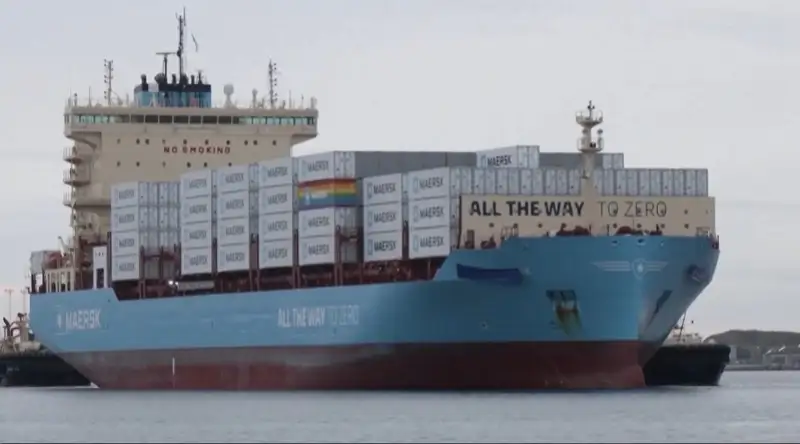
As of December 19th local time, the situation in the Red Sea has remained tense, and several international shipping giants have announced detours. It is reported that currently, in addition to container shipping companies such as Maersk and Delta Mediterranean announcing the suspension of Red Sea shipping services, energy companies such as BP and Norwegian National Oil Company have also announced the suspension of transportation through the Red Sea.
Previously, German shipping company Herbert announced on the 15th that from today until the 18th, all container ships passing through the Red Sea will be suspended. Danish Maersk Shipping Group also announced on the same day that it will suspend all container ship transportation through the Strait of Mandela and the Red Sea. On the 16th, the Mediterranean shipping company and the French shipping group Delta Air Lines requested their cargo ships to suspend navigation in the Red Sea and avoid the Suez Canal route.
According to Clarkson, a shipping and marine research institution, the total container capacity of these suspended Red Sea shipping services currently accounts for 74% of the total global container fleet capacity.
Since the outbreak of a new round of Palestinian Israeli conflict on October 7th, Yemeni Hussai militants have frequently launched missile and drone attacks on Israel under the pretext of supporting Palestine, and have continuously attacked ships associated with Israel in the Red Sea. Due to frequent incidents of ship attacks, multiple container shipping companies have had to announce the suspension of their container ships from sailing in the Red Sea and nearby waters. The tense situation in the Red Sea waters means that the risk of spillage from the Israeli Palestinian conflict has intensified, affecting international shipping operations.
According to the Swiss newspaper "The New Zurich", due to the continuous attacks of Yemeni Houser armed groups on merchant ships in the Red Sea, only China COSCO Shipping's cargo ships are still passing through the Suez Canal.
As a necessary route through the Suez Canal, the Red Sea holds an important position in global shipping routes, and together with the Suez Canal, it forms the Eurasian water corridor. According to Clarkson's research statistics, the annual volume of goods transported through the Suez Canal accounts for approximately 10% of the total global maritime trade. Therefore, this is a true lifeline for shipping.
Taking the current transportation industry of new energy vehicles as an example, according to a report on a German website on December 17th, due to the escalating tensions in the Red Sea, Tesla electric vehicles have chosen an alternative route for sea transportation from China to Europe, which is to detour around the Cape of Good Hope. With the extension of the route, the transportation cost of electric vehicles will increase by about 20%.
At the same time, if the Far East Nordic route changes from passing through the Suez Canal to taking a detour through the Cape of Good Hope, the journey will increase by about 10 days, which will have a direct impact on the logistics and container prices of Chinese cargo transportation.
Official statistics show that since November 19th, 55 ships have abandoned passing through the canal and diverted around the Cape of Good Hope in South Africa, but more than 2000 ships still crossed the canal during the same period. At present, due to drought restrictions and the risk of war in the Red Sea, the Panama Canal is facing transportation difficulties in Asia, Europe, and the Americas, which will have a significant impact on global trade.
In addition, the current increase in freight rates is in line with the annual negotiations on long-term freight rates, so liner companies have been continuously raising prices recently. The freight rates of oil tankers in the Mediterranean region have risen by over 9%, and may have further impacts on the shipping market in the coming days. The shipping market is optimistic about the profitability of shipping companies and the subsequent market rise, which has also boosted the stock prices of some shipping companies. Some of the major container shipping companies have seen an average increase of 13% in stock prices over the past 7 days.
As a true lifeline for shipping, the obstruction of the Red Sea will have profound impacts on the global economy, politics, and even military. As a spillover of the Israeli Palestinian conflict, it will inevitably undergo unpredictable changes as the situation progresses. For major shipping companies around the world, the impact of this event is enormous, and opportunities and challenges coexist.
It has been proven that only through dialogue and negotiation can the political and military disputes between Palestine and Israel be properly resolved. Only by strengthening international cooperation, continuously expanding routes, and promoting economic transformation and upgrading can we ensure sustainable economic development and stand undefeated in fierce international competition.

Since 2022, the Fed has cumulatively reduced its balance sheet by $2.4 trillion through quantitative tightening (QT) policies, leading to a near depletion of liquidity in the financial system.
Since 2022, the Fed has cumulatively reduced its balance sh…
On December 11 local time, the White House once again spoke…
Fiji recently launched its first green finance classificati…
Recently, the European Commission fined Musk's X platform (…
At the end of 2025, the situation in the Caribbean suddenly…
The U.S. AI industry in 2025 is witnessing a feverish feast…